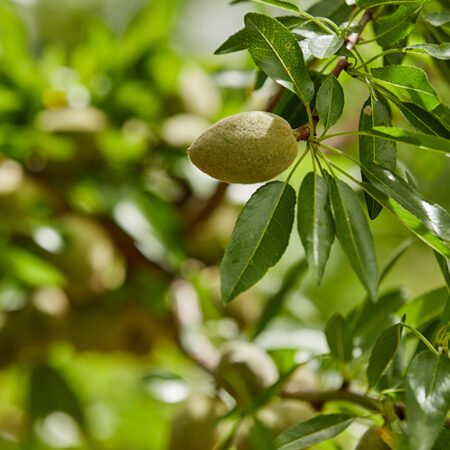Almonds, calories and getting fit
It is important to think about the nutrient density of our snacks and meals and less about the calorie/kilojoule density.

Almonds, less calories/kilojoules than you think
Do you pick up a food packet, read the nutrition panel on the label and put it back if you think the fat and/or calories/kilojoules are too high? Well if almonds are one of those foods, think again. Research has found that those nutrition panels do not show us the whole picture. Measuring the foods composition in a laboratory analysis, is not the same as what our body absorbs through digestion.
Our body is not 100% efficient at digesting and absorbing everything from the food we eat, particularly if the food, like almonds contain dietary fibre. It is a big ask for the body to break down food into minuscule particles for us to absorb it. The body does a very good job but some ‘slips’ through.
A controlled human clinical study conducted by scientists from USDA’s Agricultural Research Service (ARS) and jointly funded by the Almond Board of California found that 25% fewer calories/kilojoules were absorbed from whole unroasted almonds and 19% fewer calories/kilojoules from whole roasted almonds than the number listed on nutrition labels. This study measured the actual digested and absorbed calories/kilojoules from the almonds.
The chewing process doesn’t completely breakdown the almond cell walls therefore they can not be completely absorbed and some is excreted, hence the lower calorie/kilojoules absorbed.
Are all calories/kilojoules equal?
A kilojoule (or Calorie) is a unit of energy to measure how much energy is in a food or drink. In Australia we use kilojoules (kJ). Fat contains 37 kJ per gram, protein 17 kJ per gram and carbohydrate 16 kJ per gram. 1 kJ=4.2calories
It seems that some calories/kilojoules fill us up more than others, they have greater satiety value. For example, research indicates that a slightly higher protein intake in a single meal and over a day may promote greater satiety. Including foods containing protein, such as nuts, may result in less total calories/kilojoules eaten over the day.
Foods with dietary fibre seem to fill us up more and for longer also, slowing the rate that food is digested. Fibre is a carbohydrate that is not digested by the body and passes to the large intestines. Therefore a food with the same calorie/kilojoule level, one being high in fibre and the other without have a different effect on how full you feel. The high fibre food is likely to keep you full for longer, therefore you may eat less total food for the day with high fibre foods. For example a handful of almonds which provide protein and dietary fibre is likely to keep you full longer than eating a biscuit that is high in carbohydrate, fat and low in fibre.
How many calories/kilojoules do we need when training?
Everybody’s energy needs will change depending on activity level, sex-male or female, body composition (muscle uses more energy than fat), age and many other factors. Your energy needs will also change day to day. As we can see counting calories/kilojoules of foods can be somewhat inaccurate and not include the whole picture, depending on how the body digests the particular food. It is therefore important to look at the food as a whole for its nutritional value, rather than simply the calories/kilojoules a nutrition panel says it provides.
In saying that to maintain muscle mass, we need to keep our calorie/kilojoule intake up to meet our expenditure to avoid the body breaking down muscle to provide energy. We can of course burn body fat to provide energy, however if you are severely restricting your calorie/kilojoule (energy) intake the chances are your body will shed muscle along with body fat. Therefore, don’t skimp and restrict food intake.
The timing of meals can be important to avoid numerous periods of calorie/kilojoule deficits and low protein throughout the day. Providing enough energy and protein at times of exercise is important particularly for those wishing to gain muscle mass. Numerous studies have shown that people build more muscle and gain less body fat (or shed more body fat) when they eat adequate protein and kilojoules/calories within two hours after exercise than when they do not, despite consuming the same total number of calories over the course of the day. In most cases you still don’t need to count the calories/kilojoules, to achieve muscle maintenance (unless maybe an endurance athlete and you struggle to maintain weight), instead:
- Listen to your appetite and use this to help guide when and how much food you eat
- Monitor your energy levels, if low you may need to eat more and look at timing
- Remember if gaining muscle is important to you, take your snack containing protein for after exercise and plan when your next meal will be
- If wanting to gain muscle mass you may monitor protein intake rather than calorie/kilojoule (generally between 1-1.5grams of protein per kilogram body weight) (refer to or hyperink to the first blog- homeworkout)
- Include a range of nutritious foods containing protein, healthy fat and carbohydrate rather than counting calories- think nutrient density not calories/kilojoules
More to food than calorie/kilojoules: nutrient dense wholefoods
It is important to think about the nutrient density (how many nutrients in the whole food) of our snacks and meals and less about the calorie/kilojoule density. We know, ‘a diet of minimally processed foods close to nature, predominantly plants, is decisively associated with health promotion and prevention of disease.’ Steer away from too many of the ‘empty calorie/kilojoule’ foods, the ones that are ultra processed generally with loads of refined sugar, poor quality fats, lots of salt, minimal dietary fibre and additives.
Look for nutrient dense whole foods, these will be packed with nutrients and include:
- Protein (e.g. meat, fish, nuts, seeds, dairy, legumes)
- Quality carbohydrates (e.g. wholegrain, fruits, starchy vegetables)
- Healthy fats (e.g. nuts, seeds, nut butters, olives, extra virgin olive oil, avocado
- Vegetables and other plant foods that offer a range of vitamins, minerals and antioxidants
Counting calories/kilojoules is not the way to go, it will often have you missing out on many nutrient dense foods. Listen to your appetite and energy levels and aim for a diet that has a wide range of minimally processed nutrient rich foods. You could start with a swap from biscuits or a muesli bar to a generous handful of almonds!
References:
https://www.prnewswire.com/news-releases/almonds-when-is-a-calorie-not-a-calorie-300378897.html
https://pubmed.ncbi.nlm.nih.gov/11145214/
https://academic.oup.com/ajcn/article/87/5/1558S/4650426
https://www.annualreviews.org/doi/full/10.1146/annurev-publhealth-032013-182351



